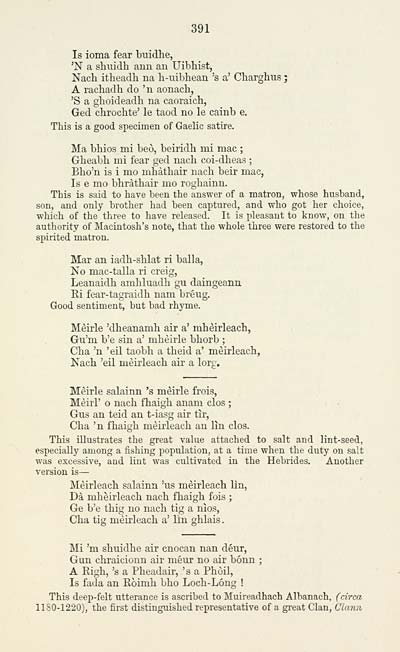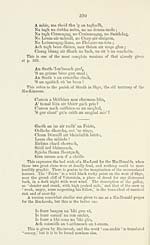Download files
Complete book:
Individual page:
Thumbnail gallery: Grid view | List view

391
Is ioma fear buidhe,
'N a sliiiidh auu an Uibhist,
Nach itheadh na h-uibhean 's a' Cliarghus j
A rachadh do 'n aonach,
'S a ghoideadh na caoraich,
Ged chrochte' le taod no le cainb e.
This is a good specimen of Gaelic satire.
Ma bhios mi beò, beiridh mi mac ;
Gheabh. mi fear ged nach coi-dheas ;
Bho'n is i mo niliàthair nach beir mac,
Is e mo bhràthair mo roghainn.
This is said to have been the answer of a matron, whose husband,
son, and only brother had been captured, and who got her choice,
which of the three to have released. It is pleasant to know, on the
authority of Macintosh's note, that the whole three were restored to the
spirited matron.
Mar an iadh-sblat ri balla,
No mac-talla ri creig,
Leanaidh amhluadh gu daingeann
Ri fear-tagraidh nam breug.
Good sentiment, but bad rhyme.
Mèirle 'dheanamh aix a' mhèirleach,
Gu'm b'e sin a' mhèirle bhorb ;
Cha 'n 'ell taobh a theid a' meirleach,
Nach 'eil meirleach air a lor? .
Mèirle salainn 's mèirle frois,
Mèirl' o nach fhaigh anani clos ;
Gus an teid an t-iasg air tir,
Cha 'n fhaigh meirleach an lin clos.
This illustrates the great value attached to salt and lint-seed,
especially among a fishing population, at a time when the duty on salt
was excessive, and lint was cultivated in the Hebrides. Another
version is —
Meirleach salaina 'us meirleach lin,
Da mheirleach nach fhaigh fois ;
Ge b'e thig no nach tig a nios,
Cha tig meirleach a' lin ghlais .
Mi 'm shuidhe air cnocan nan deur,
Gun chraicionn air meur no air bonn ;
A Righ, 's a Pheadair, 's a Phòil,
Is fada an Roimh bho Loch-Long !
This deep-felt utterance is ascribed to Muireadhach Albanach, (circa
1180-1220), the first distinguished representative of a great Clan, Clann
Is ioma fear buidhe,
'N a sliiiidh auu an Uibhist,
Nach itheadh na h-uibhean 's a' Cliarghus j
A rachadh do 'n aonach,
'S a ghoideadh na caoraich,
Ged chrochte' le taod no le cainb e.
This is a good specimen of Gaelic satire.
Ma bhios mi beò, beiridh mi mac ;
Gheabh. mi fear ged nach coi-dheas ;
Bho'n is i mo niliàthair nach beir mac,
Is e mo bhràthair mo roghainn.
This is said to have been the answer of a matron, whose husband,
son, and only brother had been captured, and who got her choice,
which of the three to have released. It is pleasant to know, on the
authority of Macintosh's note, that the whole three were restored to the
spirited matron.
Mar an iadh-sblat ri balla,
No mac-talla ri creig,
Leanaidh amhluadh gu daingeann
Ri fear-tagraidh nam breug.
Good sentiment, but bad rhyme.
Mèirle 'dheanamh aix a' mhèirleach,
Gu'm b'e sin a' mhèirle bhorb ;
Cha 'n 'ell taobh a theid a' meirleach,
Nach 'eil meirleach air a lor? .
Mèirle salainn 's mèirle frois,
Mèirl' o nach fhaigh anani clos ;
Gus an teid an t-iasg air tir,
Cha 'n fhaigh meirleach an lin clos.
This illustrates the great value attached to salt and lint-seed,
especially among a fishing population, at a time when the duty on salt
was excessive, and lint was cultivated in the Hebrides. Another
version is —
Meirleach salaina 'us meirleach lin,
Da mheirleach nach fhaigh fois ;
Ge b'e thig no nach tig a nios,
Cha tig meirleach a' lin ghlais .
Mi 'm shuidhe air cnocan nan deur,
Gun chraicionn air meur no air bonn ;
A Righ, 's a Pheadair, 's a Phòil,
Is fada an Roimh bho Loch-Long !
This deep-felt utterance is ascribed to Muireadhach Albanach, (circa
1180-1220), the first distinguished representative of a great Clan, Clann
Set display mode to: Large image | Transcription
Images and transcriptions on this page, including medium image downloads, may be used under the Creative Commons Attribution 4.0 International Licence unless otherwise stated. ![]()
| Early Gaelic Book Collections > Blair Collection > Collection of Gaelic proverbs and familiar phrases > (431) |
|---|
| Permanent URL | https://digital.nls.uk/76282031 |
|---|
| Description | A selection of books from a collection of more than 500 titles, mostly on religious and literary topics. Also includes some material dealing with other Celtic languages and societies. Collection created towards the end of the 19th century by Lady Evelyn Stewart Murray. |
|---|
| Description | Selected items from five 'Special and Named Printed Collections'. Includes books in Gaelic and other Celtic languages, works about the Gaels, their languages, literature, culture and history. |
|---|

